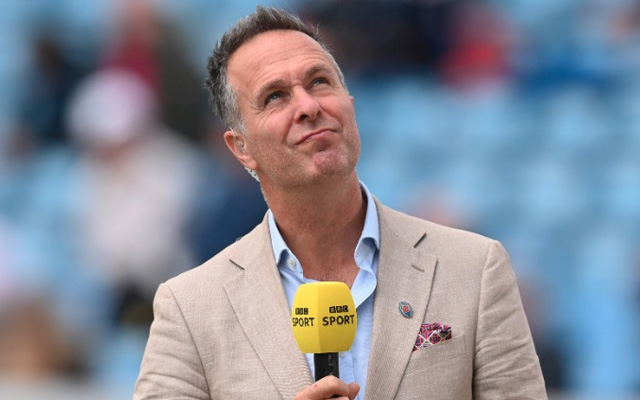Michael Vaughan is a name that echoes through the annals of English cricket history. Known for his calm demeanor, sharp cricketing mind, and articulate commentary, Vaughan has worn many hats—each with distinction. From leading England to one of its most memorable Ashes victories to becoming a respected voice in media, his journey is both inspiring and influential.
Quick Bio
| Attribute | Details |
|---|---|
| Full Name | Michael Paul Vaughan |
| Date of Birth | October 29, 1974 |
| Birthplace | Manchester, England |
| Batting Style | Right-handed |
| Bowling Style | Right-arm off break |
| Role | Top-order batsman, former England captain |
| International Debut | ODI: May 23, 2001 / Test: Nov 10, 1999 |
| Total Test Matches | 82 |
| Test Runs | 5,719 |
| ODI Matches | 86 |
| Major Achievement | Captained England to 2005 Ashes win |
| Post-Retirement Role | Cricket commentator, columnist |
Early Life and Cricketing Background

orn in Manchester and raised in Sheffield, Michael Vaughan began his cricketing journey at a young age. He showed promise during his school years and eventually made his way into the Yorkshire county setup. His technical elegance and composed personality made him a standout performer in junior cricket. Despite being a natural batsman, he also bowled occasional off-spin in his early years, although his focus quickly shifted to dominating with the bat. Vaughan’s early days were marked by patience, discipline, and a clear understanding of the game, qualities that would later define his captaincy.
Rise to International Cricket

Michael Vaughan made his Test debut for England against South Africa in 1999, but it wasn’t until the early 2000s that he truly established himself in the team. His breakthrough came during the 2002/03 Ashes series in Australia, where he scored three centuries and finished as the series’ highest run-scorer. This incredible performance earned him admiration not just in England but around the cricketing world. His ability to tackle fierce Australian bowlers on their home turf was seen as a sign of true greatness.
By the time he was appointed England’s Test captain in 2003, Vaughan had already cemented his place as one of the most technically gifted batsmen of his era. His rise wasn’t overnight—it was built on consistent performances and a mature cricketing brain.
Captaincy and the 2005 Ashes Victory

Michael Vaughan’s leadership is most famously associated with the historic 2005 Ashes series, where he led England to a 2-1 victory over Australia—England’s first Ashes win since 1987. This series is often regarded as one of the greatest in cricket history. Vaughan’s tactical acumen, calm under pressure, and ability to get the best out of his players, including stars like Andrew Flintoff and Kevin Pietersen, were crucial to the triumph.
Under his captaincy, England became a well-rounded unit capable of taking on the world’s best. Vaughan emphasized planning, preparation, and psychological readiness. His decision-making during the Ashes, including field placements and bowling changes, was praised by critics and players alike. This win not only revived English cricket’s global stature but also brought back public enthusiasm for the sport.
Batting Style and Technique
Michael Vaughan was widely regarded as one of the most elegant batsmen of his generation. He had a classical batting technique, often compared to greats like David Gower and Mark Waugh. His cover drives were a thing of beauty—timed to perfection and played with minimal effort. Vaughan excelled against both pace and spin, showing versatility across all conditions.
One of his key strengths was his footwork, especially against spin bowlers. He often danced down the track or used the depth of the crease to manipulate field placements. Vaughan’s style wasn’t just about aesthetics; it was also incredibly effective. Despite a few technical issues later in his career, he remained a dependable presence in England’s top order for years.
Key Performances and Milestones
Among Vaughan’s standout performances, his 177 against Australia at Adelaide in 2002 remains iconic. His ability to score heavily against top-quality bowling attacks highlighted his temperament and class. In total, he scored 18 Test centuries and was particularly dominant between 2002 and 2004.
His 2002 season remains one of the best by an English batsman, where he amassed over 1,400 runs in a single calendar year—a rare feat. Although his ODI record wasn’t as impressive, he still played several key innings, especially as a stabilizing force in the middle order.
Injuries and Challenges
Vaughan’s career was, unfortunately, hampered by recurring injuries, particularly to his knee. These physical setbacks meant he missed several matches and often had to return to the team after long layoffs. His knee injuries started becoming serious post-2005 and eventually impacted his form and confidence at the crease.
The burden of captaincy also took a toll. As England’s leader, Vaughan had to balance his personal form with team management. The constant pressure affected his batting average, and he sometimes struggled with consistency. Still, his influence on the team’s structure and mentality remained profound.
Retirement from Professional Cricket
In 2008, Michael Vaughan announced his retirement from international cricket, bringing down the curtain on an illustrious career. He stepped down as captain after a series defeat to South Africa and eventually retired to make way for new talent. Although his final years as a player were marred by injuries and form dips, Vaughan’s legacy as a captain and batsman was firmly intact.
His retirement was met with emotional tributes from teammates, fans, and cricketing legends. Many praised his leadership qualities and his role in transforming England’s cricketing culture.
Transition to Commentary and Media
After retirement, Michael Vaughan seamlessly transitioned into a career in cricket commentary and analysis. He became a regular voice on platforms like BBC’s Test Match Special, Sky Sports, and later on The Telegraph as a columnist. His articulate expression, deep understanding of the game, and engaging personality made him a natural fit for media.
Vaughan’s commentary is known for being balanced, insightful, and often bold. He doesn’t shy away from criticizing poor performances and is vocal about improving team culture and strategy. His media career has allowed him to stay connected to the game while offering fans a deeper understanding of cricket tactics and team dynamics.
Controversies and Public Image
While widely respected, Vaughan has occasionally been involved in controversies, particularly in the media space. His opinions on team selections, player form, and cricketing politics have sparked debates. In recent years, he was also named in discussions around racism in cricket, which led to temporary removal from some media roles. Vaughan has denied any wrongdoing, and the issue brought broader attention to the need for inclusivity in English cricket.
Despite these setbacks, his overall image remains that of a thoughtful leader and an honest commentator who speaks his mind. Public opinion remains largely favorable, with many valuing his contributions both on and off the field.
Legacy in English Cricket
Michael Vaughan’s legacy lies not just in the number of runs he scored or the matches he won as captain, but in how he reshaped the English cricket team’s mindset. Before Vaughan, England was often seen as inconsistent and lacking self-belief. Under his leadership, the team developed resilience, professionalism, and a winning mentality.
His contributions set the stage for future captains like Andrew Strauss and Alastair Cook, who built on the foundation Vaughan created. His impact is still felt in England’s modern cricketing approach—strategic, confident, and fearless.
Impact on Future Generations
Young cricketers often cite Vaughan as an inspiration, especially for his captaincy style and technical fluency. His success in the early 2000s helped boost the sport’s popularity among the youth in England. Even now, many emerging players draw lessons from his batting technique and leadership skills.
Vaughan’s work in commentary also continues to educate newer audiences about the nuances of cricket. His voice is trusted, and his analysis often serves as a learning tool for players and fans alike.
Personal Life and Off-Field Interests
Outside cricket, Vaughan is known for his involvement in charity work and various business ventures. He has authored multiple books, including his autobiography, which gives an in-depth look into his cricketing journey. Vaughan is also active on social media, where he shares insights, cricket banter, and updates about his life.
He enjoys golf, music, and spending time with his family. Despite the busy demands of media, he continues to be a devoted father and husband, balancing public life with personal commitments.
Books and Written Contributions
Michael Vaughan has authored books like Time to Declare and Calling the Shots, which reflect on his cricketing philosophy and experiences. His writing is appreciated for its honesty and clarity. These books offer fans a deeper dive into his mindset as a player and a captain, and they are widely read in the cricket community.
Continuing Influence on English Cricket
Even years after his retirement, Vaughan’s voice remains influential in shaping conversations about English cricket. Whether through his columns or on-air commentary, his insights help shape public opinion and sometimes even influence selection debates and cricket board decisions.
He stands as a bridge between generations—someone who understands the traditional values of the game while embracing modern approaches and technologies.
FAQs
Who is Michael Vaughan?
Michael Vaughan is a former English cricketer and captain, known for leading England to Ashes victory in 2005.
When did Michael Vaughan retire?
He retired from international cricket in 2008 after a successful yet injury-hit career.
How many Test centuries did Vaughan score?
He scored 18 Test centuries during his international career.
Is Michael Vaughan a cricket commentator now?
Yes, he works as a commentator and columnist for major platforms like BBC and Telegraph.
What was Vaughan’s biggest achievement as a captain?
Leading England to win the 2005 Ashes series against Australia.
For More Latest Update biomagazine.co.uk












Leave a Reply